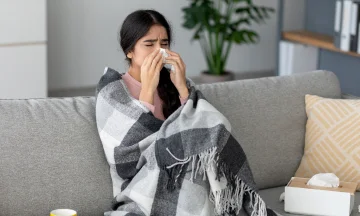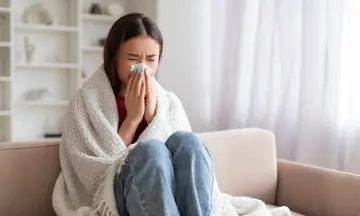
For many people, the changing of seasons is a time for enjoying new activities and beautiful weather. However, for those with asthma and allergies, a new season can feel less like a fresh start and more like a warning. This is because the same airborne substances that cause a runny nose and itchy eyes can also trigger a tightening in your chest, leading to wheezing, coughing, and shortness of breath. This is the reality of allergic asthma, the most common type of asthma, where an allergic reaction directly triggers asthma symptoms.
Navigating this can feel challenging, but by understanding your triggers and taking proactive steps, you can manage your symptoms and breathe easier all year long.
Understanding Seasonal Triggers
An allergic reaction occurs when your immune system mistakenly identifies a harmless substance as a threat. It releases chemicals that cause inflammation, which can affect your nose, eyes, and lungs. Knowing what's in the air during each season is the first step toward staying in control.
-
Spring: As the world wakes up, so does pollen. Tree pollen is the primary irritant in early spring, with species like oak, birch, and maple leading the charge. As spring progresses, grass pollen becomes more abundant, often overlapping with the tail end of tree pollen season.
-
Summer: Summer brings a mix of allergens. While grasses continue to pollinate, new players emerge, like mold spores that thrive in warm, humid conditions. Outdoor mold can be found in damp areas and decaying vegetation.
-
Fall: Don’t be fooled by the crisp air and changing leaves—fall is a prime time for allergies. The biggest offender is ragweed pollen, which can travel for hundreds of miles on the wind. As people spend more time indoors, dust mites and indoor molds can also become significant triggers.
-
Winter: Even when everything is covered in snow, asthma triggers can be lurking inside. Because we spend more time with windows closed, indoor allergens like dust mites, pet dander, and indoor mold from damp basements or bathrooms become more concentrated.
Proactive Steps for Relief
Managing seasonal triggers is all about being prepared. By taking these steps, you can significantly reduce your risk of a flare-up.
-
Monitor Pollen Counts: Stay informed! Many weather apps and websites provide daily pollen and mold counts. On days when counts are high, plan to stay indoors, especially during peak hours. For grass and tree pollen, this is often in the evening, while ragweed pollen is typically highest in the morning.
-
Create a Safe Indoor Space: When pollen counts are high, keep your windows and doors closed. Use an air conditioner to cool your home and reduce humidity, which helps prevent mold and dust mites. Consider investing in a high-efficiency particulate air (HEPA) filter for your bedroom to trap airborne allergens.
-
Clean and Rinse Regularly: After being outdoors, change your clothes and shower to rinse off any pollen that may be clinging to your hair and skin. A saline nasal rinse can also be a quick and effective way to flush allergens and mucus from your nasal passages.
-
Stay on Top of Your Medications: Don't wait until symptoms are severe. If you know a high-pollen day is coming, take your allergy medication beforehand. For asthma, the most important thing is to consistently use your long-term controller medications as prescribed by your doctor. These prevent inflammation and make your lungs less reactive to triggers. Keep your rescue inhaler on hand for any sudden symptom flare-ups.
Conclusion
Seasonal asthma triggers can be frustrating, but they are manageable. Knowing your personal triggers, monitoring the environment, and following your treatment plan are the keys to breathing easier. If your symptoms persist or worsen despite your best efforts, it is important to consult a healthcare professional. They can help you create a personalized plan to ensure you are not just surviving each season, but truly thriving in it.
FAQs
1. How do I know if my asthma is caused by allergies?
A good sign is when your asthma symptoms, like coughing or wheezing, get worse at the same time you have allergy symptoms like sneezing or an itchy nose. This usually happens during certain seasons or when you’re around something you might be allergic to, like pets. Your doctor can do tests to figure out your exact triggers.
2. Can I still exercise outside during allergy season?
Yes, but it’s smart to be careful. Check the pollen count before you go out. If it’s high, it might be better to exercise indoors. If you do go outside, try to do it in the late afternoon or evening when pollen counts are often lower. Always keep your rescue inhaler with you.
3. Do air purifiers actually help with symptoms?
They can be very helpful. An air purifier with a HEPA filter is great at catching tiny particles like pollen, dust mites, and pet dander. Putting one in your bedroom can make the air you breathe while you sleep much cleaner, which can reduce your symptoms at night.
4. When should I see a doctor for my allergies and asthma?
You should see a doctor if your current medication isn’t helping much, if you’re using your rescue inhaler more than twice a week (not counting for exercise), or if your symptoms are making it hard to go about your daily life. A specialist like an allergist can create a specific plan just for you, which might include allergy shots or other treatments.
5. What's the difference between a controller and a rescue inhaler?
A controller inhaler is a medication you take every day to prevent your airways from becoming inflamed and sensitive. It helps to keep your asthma under control in the long run. A rescue inhaler is a medication you only use when you have an asthma attack or sudden symptoms. It works quickly to open up your airways so you can breathe better right away. They serve different purposes, so it’s important to use both as directed by your doctor














